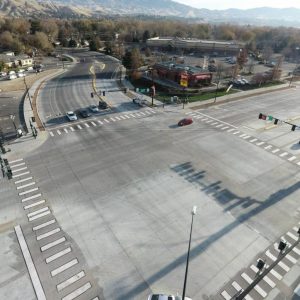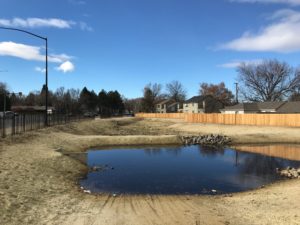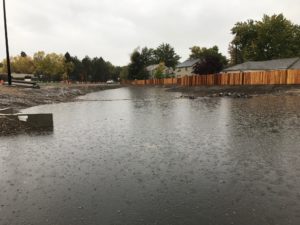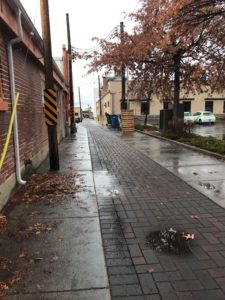 After what seemed like an eternity of disrupted traffic for State St. commuters, the new State St. and Veterans Memorial Parkway intersection is finished. Congratulate yourself if you’ve figured out how to negotiate the turn lanes. From the perspective of the Boise River, the inconvenience was well worth it. Improvements in stormwater management make this $8 million Ada County Highway District (ACHD) project a big win for fish and aquatic health.
After what seemed like an eternity of disrupted traffic for State St. commuters, the new State St. and Veterans Memorial Parkway intersection is finished. Congratulate yourself if you’ve figured out how to negotiate the turn lanes. From the perspective of the Boise River, the inconvenience was well worth it. Improvements in stormwater management make this $8 million Ada County Highway District (ACHD) project a big win for fish and aquatic health.
No More Stormwater Discharge to the River
New stormwater facilities have replaced the pipes that carried pollutant-laden water directly from State St., 36th St. and Veterans Memorial Parkway to the Boise River for decades. A combination of seepage beds, bioswales and stormwater basins now capture runoff from nearly 30 acres. From Whitewater Blvd. on the east to just beyond Arthur St. on the west and from Anderson St. on the north to N. Stilson Road on the south, stormwater is now captured and infiltrated into the ground improving water quality in the Boise River.

A basin on the south side of State St. captures stormwater from 3 acres west of the intersection. A large basin with a forebay located on the west side of Veterans Memorial Parkway captures stormwater from most of the project area – 26.75 acres. Two small basins collect neighborhood stormwater at the Glendale St. and Alameda St. cul-de-sacs.



Stormwater Carries Pollutants
While ACHD, Boise and Garden City have not permitted new buildings and roads to discharge stormwater to the Boise River for decades, stormwater from hundreds of miles of roads still travels through pipes to the Boise River. Stormwater washes pollutants off roadways, and sediment, bacteria, nutrients, oil, grease, heavy metals and trash are flushed into the Boise River. The Boise River Enhancement Plan recommends use of green stormwater infrastructure like these basins to treat stormwater onsite.
Clean Water is Essential for a Healthy Boise River
Portions of the Boise River do not meet water quality standards established by the Idaho Department of Environmental Quality. The levels of sediment, bacteria and phosphorus in the river harm fish and other aquatic organisms and have a negative impact on recreation. Discharge of untreated stormwater water to the river is one source of these pollutants. All of the water you see in the stormwater basins is water that used to dump directly into the river by Veterans Memorial Parkway bridge.
Wow! Is That a Stormwater Basin?
ACHD stormwater detention facilities have traditionally been very utilitarian. A big dirt basin surrounded by a chain link fence is a common look. ACHD made a major shift in 2017 by adopting new policies that require stormwater basins be vegetated. Vegetation improves the aesthetics of the basins and the plants uptake pollutants and provide habitat for birds and pollinators. The stormwater basins on State St. and Veterans Memorial Parkway have been seeded with native wetland and dryland plants including perennial bunchgrasses, sedges, and bulrush. A temporary irrigation system has been installed at the Veterans Memorial Pond to help the plants become established.

ACHD has built many green stormwater facilities in recent years including permeable pavers in downtown alleys, and bio-retention planters at 15th and State St. and on Capitol Blvd.
More Improvements Ahead
Large transportation and redevelopment projects are underway across the Treasure Valley. Stormwater from these projects must be retained onsite. Water quality will continue to improve as more and more stormwater is treated onsite. Keep that in mind next time you’re stuck in a construction-related traffic jam.